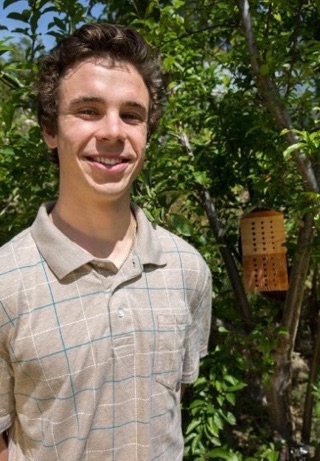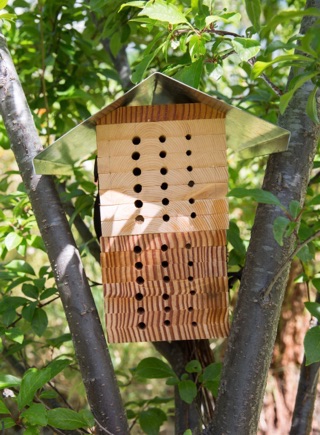Campus News
Undergraduate builds handcrafted bee hotels to attract pollinators
Mindful that the population of European honeybees is crashing worldwide due to Colony Collapse Disorder, Environmental Studies senior Forest Peri wanted to make a welcoming home for native bees.


If you build it, will they come? That’s the question Forest Peri is asking about handcrafted “bee hotels” he built and installed in six gardens around Santa Cruz County this spring.
Mindful that the population of European honeybees is crashing worldwide due to Colony Collapse Disorder, Peri wanted to make a welcoming home for native bees. Solitary bees, many of which are incredibly efficient pollinators native to Northern California, are his target audience.
“There are 20,000 species of bees around the world—over 4,000 in North America and more than 60 along the Central Coast of California—but most are very understudied,” said Peri, a senior majoring in environmental studies. “Solitary bees have a lot of potential.”
Solitary bees are commonly called mason bees for their use of mud or other “masonry” materials to construct their nests. They are known for their prodigious pollinating abilities: just 250-300 females can pollinate an acre of apples, equivalent to the work of 20,000 European honeybees.
Unlike honeybees, solitary bees nest individually in small crevices.
Rather than the familiar stackable wooden boxes filled with frames on which honeybees build wax cells to hold honey and raise young, solitary bees fill small cavities with a series of cells. Females fill the cavities from back to front, laying larvae and a pollen sac, then plugging it with more mud before starting the process again.
Peri handcrafted his “bee hotels” in the campus wood shop and welding studio. Borrowing a proven design, he drilled cavities into blocks of pine and Douglas fir, and welded metal roofs and other hardware. He hoped to determine the bees’ preferred material, crevice size, and surroundings—knowledge that could be a boon to those helping bees locally and beyond.
Peri installed hotels in six locations: the Alan Chadwick Garden campus, the UCSC Farm, the Kresge College Garden, the Homeless Garden Project on Delaware Avenue, Trescony Garden near the intersection of Bay Avenue and Mission Street, and the Live Oak Grange on 17th Avenue.
And then he waited.
Ten weeks later, Peri reports that only two cavities of one hotel—at the Chadwick Garden—have been occupied. But given the vagaries of scientific research, he’s not discouraged, particularly in light of his graduate student adviser’s experience: it took Hamutahl Cohen two years for any bees to occupy the bee hotels she installed as part of her dissertation research.
“Most of my academic life, especially in science, has been about setting up experiments with known outcomes,” he explained. “This is way more exciting.”
This project tapped Peri’s woodworking and welding skills, his knowledge of plant science, and his burgeoning interest in bees.
“I didn’t even know what solitary bees were a year ago,” said Peri, who designed the experiment as his senior project. “It’s been a very large learning curve.”
Peri is an engaged, committed student who brought good questions to the project, said Cohen. “Forest is genuinely curious and has an inquiring mind,” she said. “It’s been a pleasure to guide him through this project.”
Peri laments the decline of the European honeybee, which he says is linked to modern, industrial-style agriculture. Honey-loving humans domesticated the honeybee about 10,000 years ago, and it has been an inexpensive and productive agricultural partner for humans ever since—until recently, when their numbers began plummeting. Today, there is an urgent need to shore up a diverse population of pollinators.
“Having a diversity of pollinators is good, because they’re active at different times of the day and the year, their ranges are different, and they fly in different conditions,” said Peri.
Peri has enjoyed the freedom of running his own research experiment.
“There are no limitations at all,” he enthused. “There’s no one looking over my shoulder. I go check the hotels when it’s time to go check. When I go, I’m going for me. The amount of time I put into it determines the amount I’ll get out of it.”
And he has bounced back from disappointment about the paucity of bees inhabiting his hotels so far, appreciating the wide spectrum of other things he’s learning about: pests and parasitic wasps, placement of the hotels, honing his observation skills, time management, and more.
Looking ahead to life after graduation this spring, Peri says he has a lot of hobbies he’d like to pursue, including art, mountain biking, and rock climbing. A native of Marin County, Peri had hoped to go to college in Colorado, which turned out to be unaffordable. “I’m so happy I came here,” he said.
Peri has developed an enduring affection for the beauty and predictability of plants that might influence his next steps.
“Humans make very little sense to me,” mused Peri. “It seems we can never agree. Even with animals and insects, I just don’t always understand the behavior. But plants make sense. They grow toward light. They grow toward water. They’re beautiful and interesting.”
And they need bees. Pollination is vital to the plant life cycle, and Peri holds out hope that his hotels will yet contribute to a growing local bee population.
“I went into this thinking I might make a cool discovery, and maybe I still will,” he said.